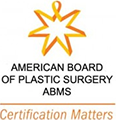Surgical Approaches to Breast Augmentation
November 24, 2014
breast augmentation, breast implants, capsular contracture, gummy bear implants, implant placement, incision types, Keller Funnel, mammogram
Many of the women that I see who are seeking breast augmentation are very well informed about the many different sizes and styles available in breast implants, whether they are simple saline, silicone, or the new form-stable gummy bear implants. Far fewer, however, are aware of the impact that the specific surgical approach, including implant placement and incision choice, can have on the final breast augmentation results.
One important early decision that needs to be made involves where the implant will be placed, specifically whether it will be underneath or over the chest muscles. Placing the implants above the muscle, just under the skin and glandular tissue, is a less invasive procedure, involving less post-operative discomfort and downtime. It also typically creates a fuller appearance and more pronounced cleavage. However over-the-muscle implants may have a less natural look, particularly in women who started with only minimal breast tissue. Additionally, any rippling caused by imperfections in the implant itself will be more readily apparent when the implant is covered only by a thin layer of skin. While placing the implants beneath the muscle requires more invasive surgery, the result is usually a more subtle, natural looking slope in the upper breast. Implants placed under the muscle also have a reduced risk of capsular contracture and are less likely to interfere with the results of a mammogram.
Incision placement can also affect the final appearance of the augmented breast. An effort is always made to make incisions as small as possible (usually between 2cm and 6cm) and to make them in inconspicuous areas in order to minimize visible scarring. However, the specific location of the incision depends largely on the type of implant used as well as the individual patient’s needs. Most commonly, inframammary incisions are made underneath the breast, in the crease where the breast meets the torso. These incisions allow for the most direct access to the breast tissue and chest muscle. Since saline implants are placed into the body before they are filled, they can frequently be introduced through transaxillary incisions underneath the armpit. Finally, periareolar incisions around the nipple can be used if the appearance of scars is a major concern. However, I generally do not recommend this approach as it is associated with a higher likelihood of breast feeding difficulties and the loss of nipple sensation. I have found that the use of the Keller Funnel™, a device that directly transfers the implant from the packaging to the breast cavity, allows me to safely place silicone and highly cohesive gummy bear implants using smaller incisions and with a reduced risk of the bacterial contamination that can cause infection or capsular contraction.
During our initial consultations I will carefully go over all of the options available and make recommendations based on your specific anatomy and aesthetic goals. Only then will we be able to choose the particular approach that will lead to the best possible breast augmentation results.
If you have any questions about any of the treatments that I offer, please contact me today to schedule a consultation. Additionally, Atlanta Plastic Surgery, P.C. provides a variety of options for financing, including Care CreditSM, to assist you. Don’t forget to connect with me, Dr. Hunter Moyer, on Facebook, Twitter, and Google+ for the latest plastic surgery news.









